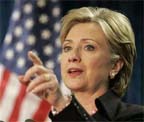BEIJING (Reuters) – US Secretary of State Hillary Clinton said yesterday the United States and China can help pull the world out of economic crisis by working together and made clear this took precedence over US concerns about human rights in China.
Making her first visit to China as secretary of state, Clinton took a softer line on Chinese political and religious freedoms than in a 1995 Beijing speech in which she openly criticised the Chinese government’s human rights record.
Speaking at a news conference with Chinese Foreign Minister Yang Jiechi, Clinton said the two would have “frank discussions on issues where we have disagreements, including human rights, Tibet, religious freedom and freedom of expression.”
However, she suggested their joint efforts to spur growth in the face of the global financial crisis, to curb global climate change and to address security challenges like North Korea’s nuclear weapons programme came first.
“World events have given us a full and formidable agenda,” she said, saying she and Yang had wide-ranging talks “that started from a simple premise: it is essential that the United States and China have a positive, cooperative relationship.”
Making her final stop on a one-week Asian trip that has also taken her to Tokyo, Jakarta and Seoul, Clinton stressed how intertwined are the US and Chinese economies.

The United States is one of the largest buyers of Chinese exports while China, with foreign exchange reserves of about $2 trillion, is the world’s largest holder of US government debt.
“I appreciate greatly the Chinese government’s continuing confidence in United States Treasuries. I think that’s a well grounded confidence,” Clinton said. “We have every reason to believe that the United States and China will recover and that together we will help to lead the world recovery.”
Asked if China might someday rethink its purchases of US Treasuries, Yang provided little direction, saying only that China makes decisions on how to invest its foreign exchange reserves so as to ensure their safety, value and liquidity.
Highlighting the US desire for China to curb greenhouse gas emissions, Clinton visited a low-emissions heat and power plant that runs with generators from General Electric Co.
“The United States, and certainly the Obama administration, we want China to grow,” she said after touring the plant. “What we hope is that you won’t make the same mistakes we made… When we were industrialising … we didn’t know any better.”
China and the United States are the world’s leading emitters of greenhouse gases and their reaching an accord on limiting emissions is regarded as essential for a global deal.
Clinton met President Hu Jintao and Premier Wen Jiabao and, before leaving today, was to attend church and meet “civil society” activists, gestures designed to show interest in political and religious freedom without causing offence.
Taking a markedly different stance from her 1995 Beijing speech, Clinton on Friday said Washington would press China on human rights but said this would not “interfere” with their work on the financial crisis, climate change and security.
Human rights groups argued that Clinton’s position undermined US leverage with China on rights.





